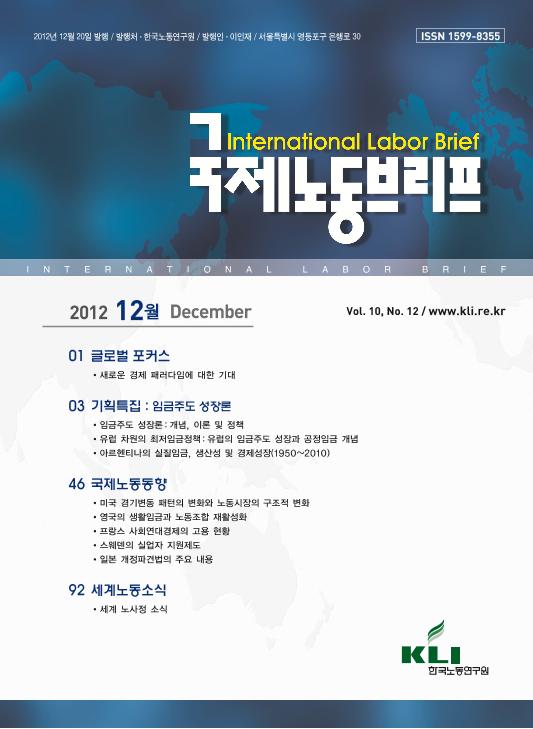Mostrar el registro sencillo del ítem
dc.contributor.author
Graña, Juan Martin

dc.contributor.author
Kennedy, Damián

dc.date.available
2023-06-07T02:29:41Z
dc.date.issued
2012-12
dc.identifier.citation
Graña, Juan Martin; Kennedy, Damián; 아르헨티나의 실질임금, 생산성 및 경제성장(1950~2010); Korea Labor Institute; International Labor Brief; 10; 12; 12-2012; 32-45
dc.identifier.issn
1599-8355
dc.identifier.uri
http://hdl.handle.net/11336/199788
dc.description.abstract
지난 80년간 아르헨티나는 두 가지의 매우 상이한 경제체제를 경험했다. 첫째는 1930년대부 터 1970년대 중반까지의 ‘수입대체 산업화(Industrialization by Import Substitution: ISI)’ 모델로, 이는 분배정책과 고임금에 의해 생성된 강력한 국내시장을 통한 제조업 부문의 육성을 특징으 로 한다. 둘째는 합의된 명칭은 없지만, 무역 및 금융 개방을 통해 실행되었다.1) 즉 성장의 내적 유인(내수시장)이 외적 유인(수출)으로 대체된 것이다. 후자 체제의 경우, 생산성 저하를 보완 하고 따라서 ‘경쟁력’을 확보하기 위해 임금격차 감소가 필수적이었다고 보인다. 그리고 이는 경제성장으로 이어지지 못했고, 실질임금을 낮추는 데는 매우 성공적이었다. 이러한 논란의 중심에는 경제 발전에 있어 실질임금(과 소득분배)의 역할에 관한 질문이 자 리 잡고 있다. (ISI 모델 맥락에서) 매우 다양한 이론을 통해 그 중요성이 강조되었고, 중남미에 대한 연구와 경제 토론에 있어 핵심적인 요소임에도 불구하고, 실질임금과 경제발전의 관계에 대한 분석은 1970년대 중반 이후로 점차 밀려나고 있으며, 특히 아르헨티나에서는 이러한 이 유로 인해 적합한 공식 통계가 부족한 상황이다. 노동생산성과 실질임금 간의 관계 동향 분석 을 통해 아르헨티나에서 경제 체제 변화에 따른 인력 분포 변화를 이해할 수 있다.
dc.description.abstract
During the last eighty years Argentina experience two very different economic schemes. The first, that run from the 1930s to mid seventies, called "Industrialization by Import Substitution" (ISI) was characterized -in general terms- for promoting manufacturing industries through a strong domestic market created by distribution policies and high wages. The second one, with no consensual name, was implemented though commercial and financial openness . In short, the internal drive (domestic market) of growth was changed for an external drive (exports). In the latter scheme, wage compression is deemed necessary in order to compensate the observed slow productivity pace achieving, therefore, "competitiveness". Making a long story short, that didn´t succeed regarding growth but was extremely successful in lowering real wages. At the core of this debate lies the question regarding the role of real wages -and income distribution- in economic development. Despite the importance attached by the most diverse theories and its key role in research and in the economic debate in Latin America (within the context of the Import Substitution Industrialization (ISI) model), the analysis of this relationship has been progressively set aside since the mid-1970s, especially in Argentina, where such process was accompanied by a lack of adequate official statistics. The study of this subject allows us to reveal how workforce is allocated in the different economic schemes, through the analysis of the evolution of the relation between labour productivity and real wages. With that objective, Section 1 shows our approach to functional income distribution and its evolution in Argentina . In Section 2, we address its determining factors (productivity and real wages) as well as its trends. In every case we will make comparative analysis with other countries as Japan, Mexico and USA. Last, Section 3 includes some partial conclusions and questions for further analysis.
dc.format
application/pdf
dc.language.iso
kor
dc.publisher
Korea Labor Institute
dc.rights
info:eu-repo/semantics/openAccess
dc.rights.uri
https://creativecommons.org/licenses/by-nc-sa/2.5/ar/
dc.subject
FUNCTIONAL DISTRIBUTION
dc.subject
PRODUCTIVITY
dc.subject
REAL WAGE
dc.subject.classification
Economía, Econometría

dc.subject.classification
Economía y Negocios

dc.subject.classification
CIENCIAS SOCIALES

dc.title
아르헨티나의 실질임금, 생산성 및 경제성장(1950~2010)
dc.title
Real wages, productivity and economic growth in Argentina (1950-2010)
dc.type
info:eu-repo/semantics/article
dc.type
info:ar-repo/semantics/artículo
dc.type
info:eu-repo/semantics/publishedVersion
dc.date.updated
2023-06-06T13:24:20Z
dc.identifier.eissn
1599-8355
dc.journal.volume
10
dc.journal.number
12
dc.journal.pagination
32-45
dc.journal.pais
Corea del Sur

dc.journal.ciudad
Seúl
dc.description.fil
Fil: Graña, Juan Martin. Universidad de Buenos Aires. Facultad de Ciencias Económicas. Instituto de Investigaciones Económicas. Centro de Estudios sobre Población, Empleo y Desarrollo; Argentina. Consejo Nacional de Investigaciones Científicas y Técnicas; Argentina
dc.description.fil
Fil: Kennedy, Damián. Universidad de Buenos Aires. Facultad de Ciencias Económicas. Instituto de Investigaciones Económicas. Centro de Estudios sobre Población, Empleo y Desarrollo; Argentina. Consejo Nacional de Investigaciones Científicas y Técnicas; Argentina
dc.journal.title
International Labor Brief
dc.relation.alternativeid
info:eu-repo/semantics/altIdentifier/url/https://www.dbpia.co.kr/journal/articleDetail?nodeId=NODE02058002
Archivos asociados
